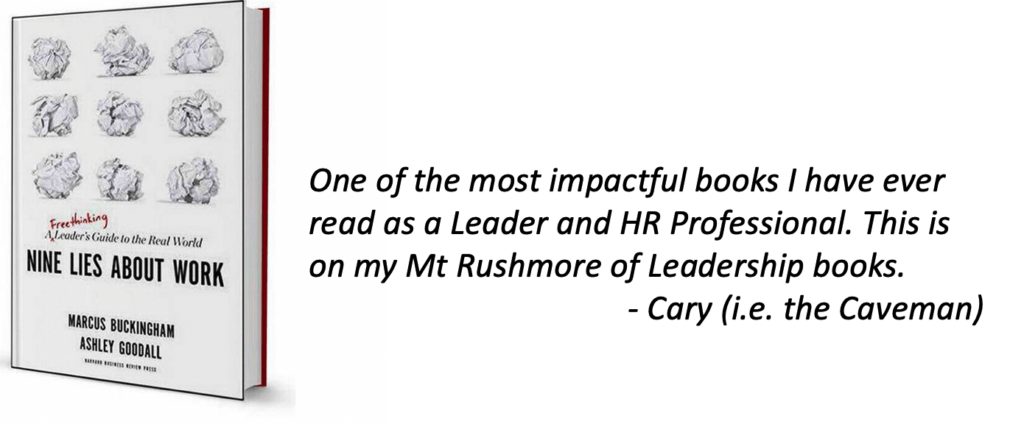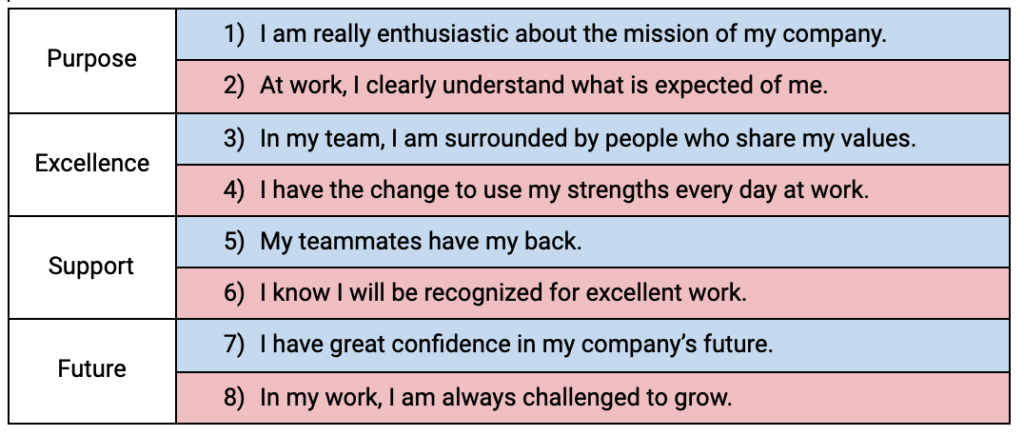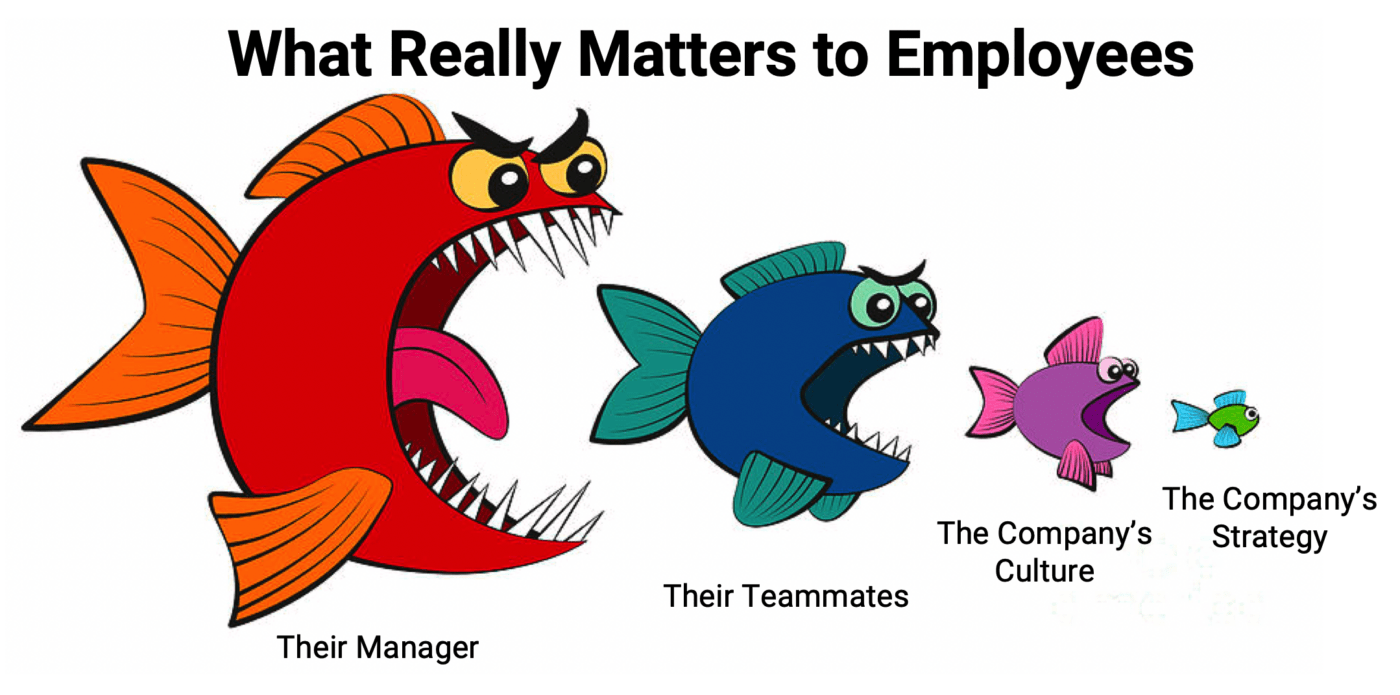Nine Lies – Company’s Culture Doesn’t Matter
“Culture eats strategy for breakfast”
(attributed to Peter Drucker)
“Culture might eat strategy for breakfast, but teams make or break your culture”
(me)
Your organization’s culture is one of the most critical things that sets your company apart from its competitors. Business books, articles, and thought leaders have been spouting the importance of building a strong and robust culture for over 20 years. There are yearly rankings of which company is best to work for based on their culture (Forbes – 2020 Best Companies to Work For and Fortune’s 100 Best Companies to Work for), and there are even companies that specialize in helping you find the right company to work for (Glassdoor and Great Places to Work).
People care about the culture of their organization, at least that’s what we’ve been told. When “great” companies are compared, they often focus on the large company wide perks. Hence why a lot has been written about different companies that offer things like dry cleaning or on-site daycare, or have fun and whimsical offices. But the importance of culture and of these perks is dramatically overblown. The truth is far simpler. People care more about their team and team leader than they do about their company, its culture, and any perks they receive.
Nine Lies – Company’s Culture Doesn’t Matter

The Nine Lies We All Believed
While I always believed in the importance of teams, my eyes were first opened to this truth by the book “Nine Lies About Work: A Freethinking Leader’s Guide to the Real World” by Marcus Buckingham and Ashley Goodall. Nine Lies uses research, data, and engaging stories to identify and dismantle some of the most common beliefs we hold about work and replace them with simpler truths. I can personally attest that some of my core beliefs about leadership and high performance were completely shook up.
My personal belief is that every senior leader and HR manager needs to read Nine Lies, and that is why I am going to introduce you to the 9 different lies in the book. For example, I have previously shared Lie #4 – Great Leadership can be defined by a set of competencies and skills. The truth is that great leaders are unique, and there is no recipe for great leadership. My goal is to give you an overview of the 9 lies, and help you integrate the truths into your teams. But even my articles cannot replace the whole book, so I hope that you buy this book.
Nine Lies – Company’s Culture Doesn’t Matter

Team Quality Matter More Than Culture
If we really thought about it, we shouldn’t be all that surprised that the quality of teams and team leaders are more impactful than the culture of the company. Most of us are a part of multiple teams at work. For large companies (above 150 people) 82% of employees work on teams, and 72% work on multiple teams. Even small companies (under 20 employees) are built around teams; 68% of employees work on teams and 49% work on multiple teams. Gone are the days of the individual working alone in their office.
In today’s companies, the majority of work is built around teams and collaboration, and our happiness and engagement is shaped by these interactions. While I really appreciate my company’s lunch offering and our decadent beer fridge, the interactions I have with my colleagues are what make or break my day. On the flip side, I have also quit 2 jobs in companies I really liked because of how I felt about my manager.
No matter how good the company culture is, if someone really dislikes the people they work with then chances are they are probably disengaged. For example, team members who said that they did not trust their team leader were twelve times more likely to be completely disengaged from work. And once someone starts feeling disengaged, they are significantly more likely to leave. Teams that have low engagement levels have attrition rates 45% higher than engaged teams. It shouldn’t be a surprise that people don’t want to stick around people they dislike and in a role that is demotivating.
Nine Lies – Company’s Culture Doesn’t Matter

How to Measure Team Quality
Hopefully by now you are recognizing the importance of teams and team leaders, but you are probably asking yourself how you can assess whether your team is good or not. Truth be told there are many different models of high performing teams. I know I personally believe a lot in the 5 Dysfunctions of High Performing Teams, and also the Forming, Storming, Norming, & Performing stages of team development. But while those models are great at showing how a leader can improve their team, they are missing easy to use metrics to check success.
That is why I would like to introduce you to the ADP’s Engagement Pulse survey. First built in the 90s, the Engagement Pulse survey was designed to understand both employee engagement and leader effectiveness through the eyes of team members. It is based on decades of accumulated qualitative and quantitative research from multiple organizations and industries. The survey validly predicts sustained team performance, and identifies specific aspects of a team / team leader that exist disproportionately in the highest performing teams.
My favorite part of ADP’s Engagement Pulse is that it is only 8 questions. There is no need to run a huge time consuming survey, when what you need to know from your team can be answered in mere minutes. These 8 questions are precisely worded to help you know how your team is doing, and give you an idea of what to improve.
Nine Lies – Company’s Culture Doesn’t Matter

The 8 Questions ADP’s Engagement Pulse Survey

You will notice that the 8 questions are categorized in different ways. The blue questions are framed around your experiences of the team, while the red questions address your personal experiences. You will also notice that the questions are split across 4 different criteria of high performing teams.
- Purpose – The best teams see how their work connects to a broader purpose and can see the larger context of their efforts.
- Excellence – The best teams have clarity on what is truly valuable, and understand precisely how they can deliver it.
- Support – Colleagues within the best teams support and help each other accomplish more.
- Future – The highest performing teams are optimistic their own growth & development and the future of the company.
Nine Lies sums up the importance of these 8 aspects of high performing teams. “What we, as team members want, is firstly to feel like we are part of something bigger, and that what we are doing is something important and meaningful. Secondly, we want to feel like we are seen, cared about, and challenged in a way that recognizes us as individuals.” That is the secret sauce. High performing teams are ones where people are brought together to accomplish something important, but at the same point everyone is recognized for their uniqueness.
Nine Lies – Company’s Culture Doesn’t Matter

Taking The First Steps Towards High Performing Teams
It is sad to say, but over my past 15 years as an HR leader, team quality was never the top priority for the HR organizations I was a part of. The focus was always on the individual when it came to performance management, identifying talent, and compensation. No one seemed to care how teams were performing. I mean we would talk about it every now and then, but nothing practical ever got done.
This is why I was so happy to read Nine Lies and find the ATD Pulse questions. It is a simple and pragmatic way to assess the health of your team. And based on that assessment you can start helping your teams improve. In fact, the remaining 8 “lies” in Nine Lies all cover different ways to improve your teams’ performance. While I will continue to write about the rest of the “lies”, it is my hope that you just buy the book and discover this different way of working for yourself.
Nine Lies – Company’s Culture Doesn’t Matter
